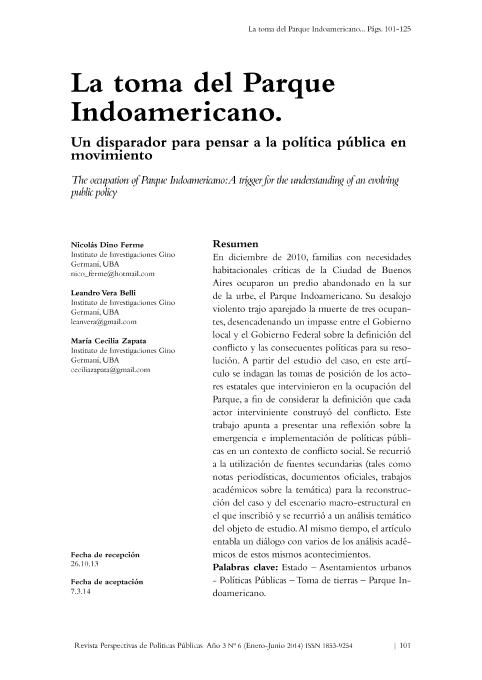Mostrar el registro sencillo del ítem
dc.contributor.author
Ferme, Nicolás Dino

dc.contributor.author
Vera Belli, Leandro
dc.contributor.author
Zapata, María Cecilia

dc.date.available
2018-01-23T22:01:42Z
dc.date.issued
2014-02
dc.identifier.citation
Ferme, Nicolás Dino; Vera Belli, Leandro; Zapata, María Cecilia; La toma del Parque Indoamericano: Un disparador para pensar la política social en movimiento; Universidad Nacional de Lanus; Perspectivas de Políticas Públicas; 3; 6; 2-2014; 101-125
dc.identifier.issn
1853-9254
dc.identifier.uri
http://hdl.handle.net/11336/34375
dc.description.abstract
Hacia diciembre de 2010, habitantes con necesidades habitacionales críticas de la Ciudad de Buenos Aires ocupan un predio abandonado en la sur de la urbe, el Parque Indoamericano. Su desalojo trajo aparejado la muerte de tres ocupantes, desencadenando un impasse entre el Gobierno local y el Gobierno Federal sobre la definición del conflicto y las consecuentes políticas para su resolución. A partir del estudio de caso, en este artículo se indagan las tomas de posiciones de los actores estatales que intervinieron en la ocupación del Parque, a fin de considerar la definición que cada actor interviniente construyó del conflicto. Este trabajo apunta a presentar una reflexión sobre la emergencia e implementación de políticas públicas en contexto de conflicto social. Se recurrió a la utilización de fuentes secundarias (tales como notas periodísticas, documentos oficiales, trabajos académicos sobre la temática).
dc.description.abstract
During December 2010, families with critical housing needs of the City of Buenos Aires seized an abandonded piece of land in the southern city´s area known as Indoamerican Park. The subsequent eviction process took the life of three of the squatters, triggering an impasse between both City´s and the Federal Government over the definition of the conflict and the policies to dive it to a salution. Through this case study, this article focuses on the stances assumed by the involved state actors so as to consider how they constructed a definition of the conflict. It points to an appraisal of the elaboration and implementation of public policies in a social conflictdriven setting. Secondary sources (such as newspaper articles, official documents and academic papers related to the issue) have been mobilized in order to reconstruct the case as well its structural scenario as well as to conduct our thematic analysis. By the same token, this article involves itself in a discussion with several academic analysis of these same events.
dc.format
application/pdf
dc.language.iso
spa
dc.publisher
Universidad Nacional de Lanus
dc.rights
info:eu-repo/semantics/openAccess
dc.rights.uri
https://creativecommons.org/licenses/by-nc-sa/2.5/ar/
dc.subject
Estado
dc.subject
Políticas Públicas
dc.subject
Tomas de Tierras
dc.subject
Parque Indoamericano
dc.subject.classification
Otras Sociología

dc.subject.classification
Sociología

dc.subject.classification
CIENCIAS SOCIALES

dc.title
La toma del Parque Indoamericano: Un disparador para pensar la política social en movimiento
dc.title
The occupation of Parque Indoamericano: A trigger for the understanding of an evolving public policy
dc.type
info:eu-repo/semantics/article
dc.type
info:ar-repo/semantics/artículo
dc.type
info:eu-repo/semantics/publishedVersion
dc.date.updated
2018-01-23T17:20:20Z
dc.journal.volume
3
dc.journal.number
6
dc.journal.pagination
101-125
dc.journal.pais
Argentina

dc.journal.ciudad
Lanus
dc.description.fil
Fil: Ferme, Nicolás Dino. Universidad de Buenos Aires. Facultad de Ciencias Sociales. Instituto de Investigaciones "Gino Germani"; Argentina. Consejo Nacional de Investigaciones Científicas y Técnicas; Argentina
dc.description.fil
Fil: Vera Belli, Leandro. Universidad de Buenos Aires. Facultad de Ciencias Sociales. Instituto de Investigaciones "Gino Germani"; Argentina
dc.description.fil
Fil: Zapata, María Cecilia. Consejo Nacional de Investigaciones Científicas y Técnicas; Argentina. Universidad de Buenos Aires. Facultad de Ciencias Sociales. Instituto de Investigaciones "Gino Germani"; Argentina
dc.journal.title
Perspectivas de Políticas Públicas
dc.relation.alternativeid
info:eu-repo/semantics/altIdentifier/doi/http://dx.doi.org/10.18294/rppp.2014.655
dc.relation.alternativeid
info:eu-repo/semantics/altIdentifier/url/http://revistas.unla.edu.ar/perspectivas/article/view/655
Archivos asociados
